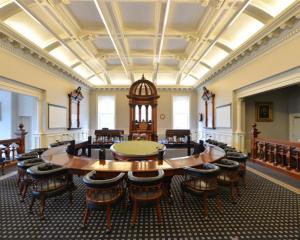
The union has come up with a business model it believes is viable for the future, and it is talking to related parties for "things to fall into line".
The ORFU was set to go into liquidation on March 2 due to debts of more than $2.3 million, with a loss projected this year of more than $750,000.
Last Friday, the union gave itself another seven days to try to stave off liquidation, and yesterday that was extended for another week.
Board chairman Wayne Graham was more upbeat yesterday about the union staying in business.
"We are still working on the situation. We are cautiously optimistic. I think during the week we've made progress and we want to explore every opportunity," Mr Graham said.
"Last week, I said a 10% to 20% chance and we are probably 50-50 now. Fingers crossed, we are hoping for the best. There are still a couple of things that need to fall into line before we know we have made it."
He did not say in any detail what the sticking points to getting a deal were, describing it as a complicated process involving a lot of parties.
The Dunedin City Council ($400,000) and the Bank of New Zealand ($1.2 million) are two of the major creditors but Mr Graham said he could not go into detail of how discussions with them were going.
"The council has always been straightforward on what their position is and we have built that into the equation ... we have put our business case on the table and the parties have to decide what that looks like."
The union had come up with a sustainable and viable business plan that gave a leaner, revamped business model.
"We had a lot of trouble getting our business to work financially and now we have done that and we are confident we have got a business that won't haemorrhage like in the past."
Mr Graham said the new business model was very conservative with revenue and expenses. However, it was not time to celebrate yet.
"We are by no means saved from liquidation. We are trying to hold off and give us every chance to stop that happening.
That [going into liquidation] has its own repercussions. We do not want to go that way. We have still got all the creditors who are part of the equation."
Mr Graham said player contracts might change to make the business model work.
Board members Sir Eion Edgar and Laurie Mains had put their own money into helping, but Mr Graham declined to say how much they provided.
He said he did not know a lot about trust payments to the unions but the union had put a freeze on trading in early December because of its financial position. The union faces questions over its payments for amateur rugby from poker machine trusts.
Morale was good among the contracted Otago players, and union staff were employed for another week.
Dunedin City Council deputy mayor Chris Staynes, when asked last night if any sort of bail-out by the council was on the cards, said that was "speculation - nothing more than that".
"Clearly, the Otago Rugby Football Union is trying to work with all of its creditors, I guess, to get an agreement. Read into that what you want. As far as I'm aware, there's no agreement reached on a bail-out."
Cr Staynes said the matter was the responsibility of DCC chief executive Paul Orders, who could not be contacted last night.












